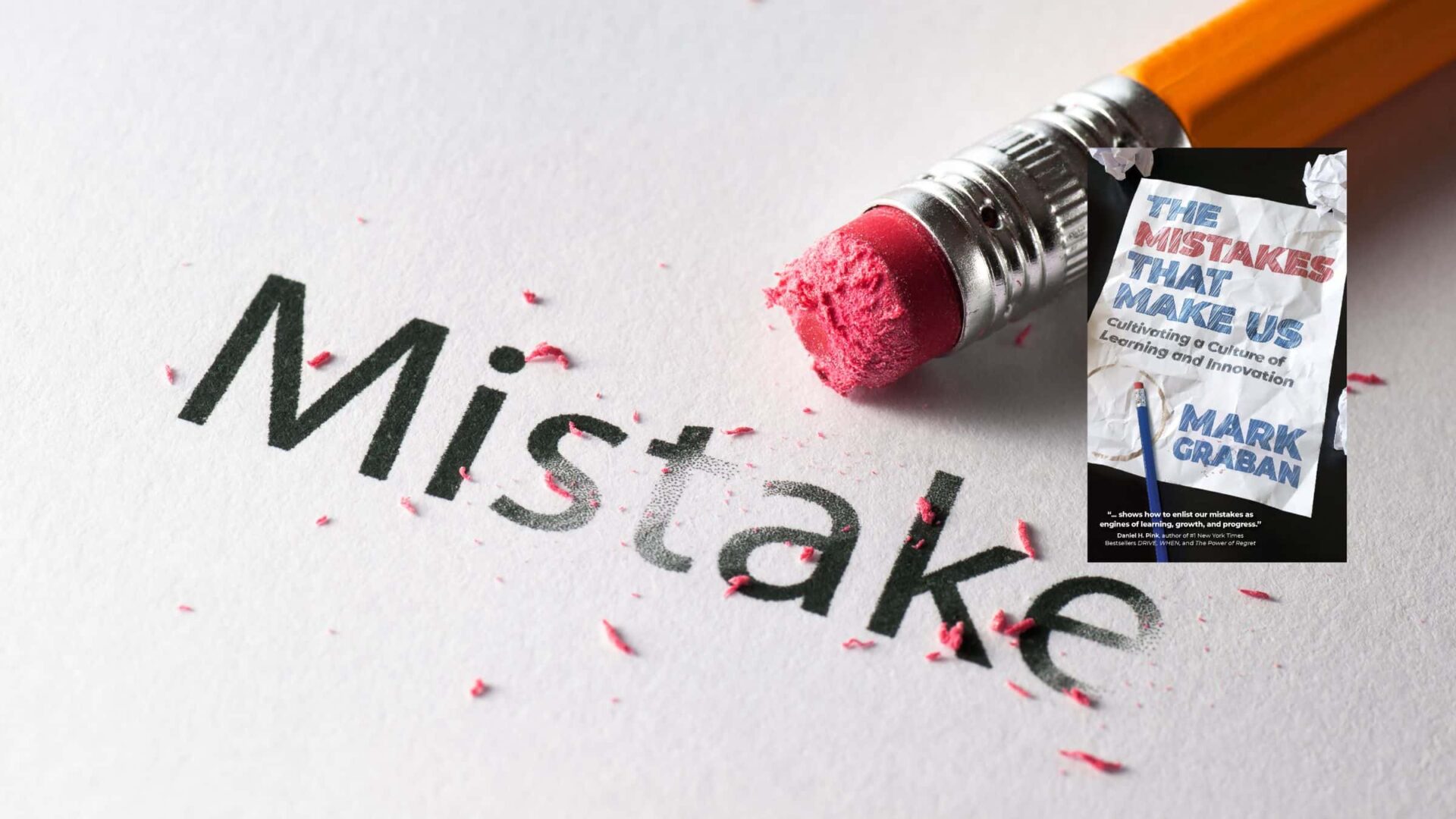The following is an excerpt from the book The Mistakes That Make Us: Cultivating a Culture of Learning and Innovation. And this post also includes some material that was cut from the book.
Get a free preview of the formatted paperback book.
Mistakes are actions or judgments that turn out to be misguided or wrong. We believe we are making the right decision at the time, but eventually discover it was wrong, whether seconds or years later. The word “mistake” is a noun. Mistakes exist, whether we recognize and admit them or not. After discovering a mistake, our choices determine if we turn it into something positive (learning and improving) or make things worse (dooming ourselves to repeating them).
Mistakes arise from decisions and actions that produce outcomes that don't match our intended results. Or we decided to maintain the status quo when we should have made a change–perhaps any change. We call this an “inaction mistake.”

We use the term “planning mistakes” for decisions and actions that were intentional and end up being wrong. An example was when I emailed a new colleague and typed “Kayleigh” as part of the email address, an intentional spelling choice. I quickly discovered my mistake when the email bounced back because the address did not exist. I didn't know how to spell her name correctly and made a bad assumption.
The term “execution mistakes” applies when our intended actions would have been correct, but we failed to follow our plan for some reason. In reply to a later email from this new employee, my fingers still managed to type “Hi, Kayleigh,” even though I had already learned that her name was spelled “Kaleigh.” I slipped up. We sometimes call this human error. I quickly learned and created the habit of using her spelling, although I might make that mistake again. Sorry, Kaleigh.
We can also define a mistake as “an error in action, calculation, opinion, or judgment caused by poor reasoning, carelessness, insufficient knowledge, assumptions, etc.” That definition also includes common causes of mistakes.
When we lack knowledge, we tend to fill that gap with assumptions that could be incorrect–leading to mistakes. Ideally, we could delay our decision until we get better information. If the information doesn't exist, we might need to move forward without realizing that we should test and evaluate our assumptions, ready to be proven wrong. Stubbornly clinging to assumptions can cause many mistakes. When an assumption turns out to be untrue, we must detect it early to adjust accordingly–celebrating what we learned instead of beating ourselves up (and hopefully others will react kindly). Mistakes caused by what seems like “carelessness” are usually more complicated than that. It's not that people don't care–even the most careful of us get tripped up by a badly designed process. Many types of human error can be prevented by various mistake-proofing techniques, as we'll learn about in Chapter Four.
Cut Material — Why Do We Make Mistakes?
Why do we make mistakes? Because we're human.
OK, end of story. Thanks for reading.
Slips, or execution mistakes, are easier to explain, as they can be caused by all sorts of human fallibilities, such as fatigue, distraction, and sloppiness. Even at our best, we're going to make mistakes.
Planning mistakes are based on decisions we make — the best we can do at a certain point in time.
Guests have shared their My Favorite Mistake stories that are centered around a decision (or a series of decisions) that seemed like the right decision at the time. Once we see a mistake, it might be caused by:
- Bad assumptions
- Bad information
- Incomplete information
- Not listening to others
- Listening to the wrong people
- Not listening to yourself
- Expecting that past performance will guarantee future results
We might base a decision on bad information. But even if we have all the needed information, our cognitive biases might still trip us up–there we go, being human.
Bad Assumptions
Many of my guests shared stories where the root of the mistake was a bad assumption. An assumption often replaces knowledge or facts – and it can be a dangerous substitute. We sometimes have to work from assumptions, but it's helpful to distinguish what we know from what we are assuming. We're better off stating our assumptions as such so that we can test (and prove or possibly disprove) the assumption(s), and perhaps prevent a mistake (or making a small mistake instead of a large one).
Note: I'll follow up with some blog posts that include examples of mistakes caused by assumptions… and those caused by a common cause of assumptions — incomplete information…
Bad Information or Incomplete Information
If assumptions replace missing knowledge, making decisions based on incorrect or incomplete information leads to many mistakes.
How do we decide if we have enough information to make the right decision? How do we know if our information is correct?
Depending on the situation, we need to strike a balance between making sure we aren't being too cautious — running the risk of waiting for perfect or fully complete information meaning that we don't make a decision — while at the same time not being too quick or reckless in making a decision.
If a situation is a relatively low risk, or if a decision allows us to click undo, so to speak, then we might move forward, realizing we can adjust. If the risk of a mistake is high, or if a decision will be permanent, we would want to be more cautious in gathering more information (and validating that information as correct, or correct enough).
What mistake have you made lately? What was the cause? Or what were the causes?
Please scroll down (or click) to post a comment. Connect with me on LinkedIn.
Let’s work together to build a culture of continuous improvement and psychological safety. If you're a leader looking to create lasting change—not just projects—I help organizations:
- Engage people at all levels in sustainable improvement
- Shift from fear of mistakes to learning from them
- Apply Lean thinking in practical, people-centered ways
Interested in coaching or a keynote talk? Let’s start a conversation.









![What’s Your Organization’s Real Mistake Policy? [Poll]](https://www.leanblog.org/wp-content/uploads/2025/07/Lean-Blog-Post-Cover-Image-2025-07-17T085114.134-100x75.jpg)
